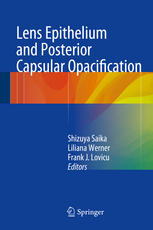

Most ebook files are in PDF format, so you can easily read them using various software such as Foxit Reader or directly on the Google Chrome browser.
Some ebook files are released by publishers in other formats such as .awz, .mobi, .epub, .fb2, etc. You may need to install specific software to read these formats on mobile/PC, such as Calibre.
Please read the tutorial at this link: https://ebookbell.com/faq
We offer FREE conversion to the popular formats you request; however, this may take some time. Therefore, right after payment, please email us, and we will try to provide the service as quickly as possible.
For some exceptional file formats or broken links (if any), please refrain from opening any disputes. Instead, email us first, and we will try to assist within a maximum of 6 hours.
EbookBell Team

5.0
48 reviewsThis book is the first to summarize the current knowledge of the cell biology of lens epithelial cells in relation to and in the development of posterior capsular opacification (PCO). PCO remains the most common long-term complication of modern cataract surgery, occurring months or years after cataract surgery, unlike most other complications that tend to arise during or soon after the procedure. Opacification of the posterior capsule appears to be linked to lens epithelial cells that are left behind in the eye during cataract removal. These cells proliferate, migrate across the posterior lens capsule, and undergo changes that result in fibrous or pearl-type opacities in the capsule.
The first section of the text explains the molecular mechanism and biology of lens epithelial cells that lead to the incidence of PCO. In the second part, in addition to a description of the mechanism and pathological condition of PCO, surgical methods and devices for preventing PCO are discussed in detail.Lens Epithelium and Capsular Opacification will benefit not only young clinical residents and junior researchers, but also established faculty in the clinical or basic academic field.